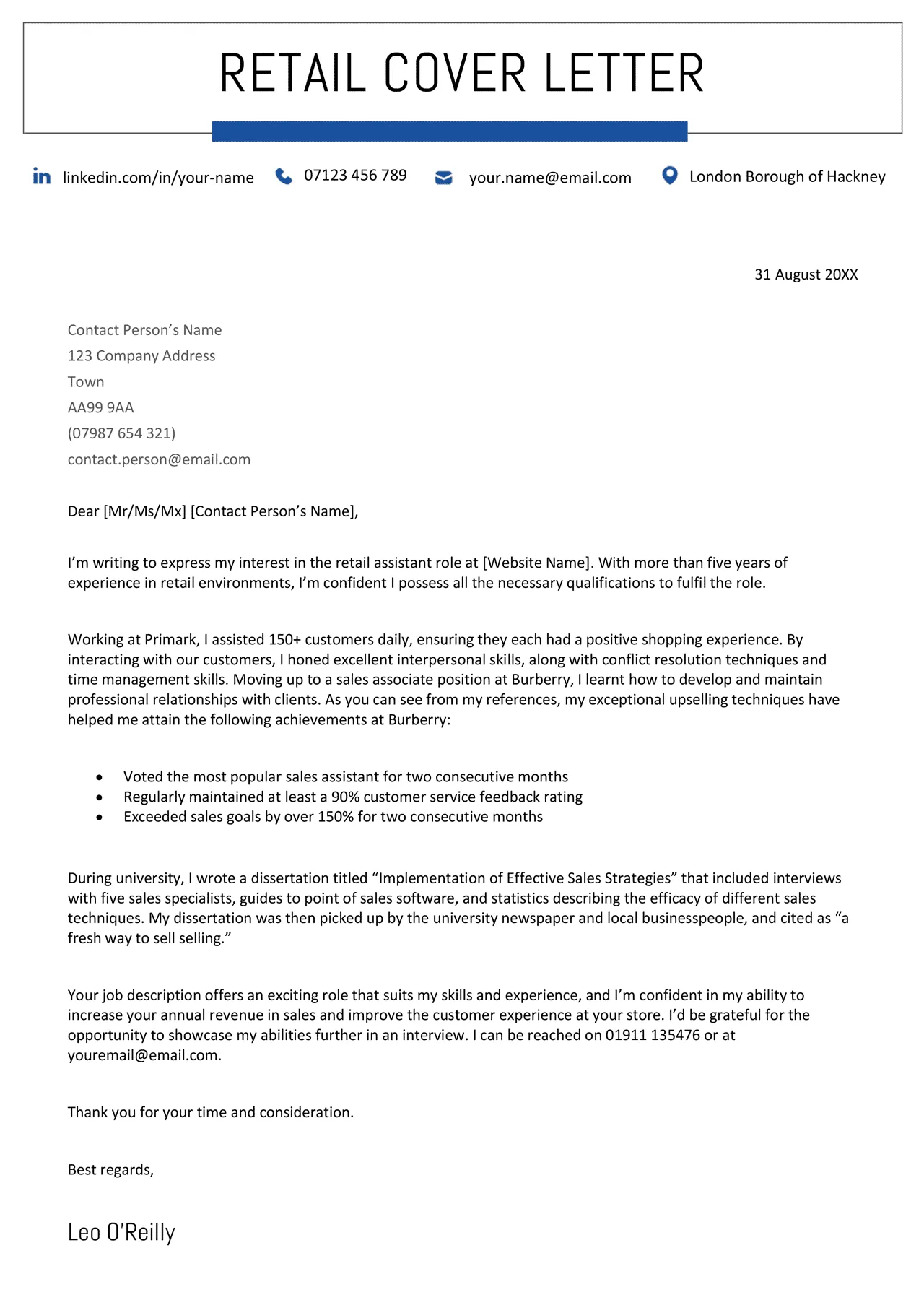What Is a Retail Job Cover Letter
A retail job cover letter is a concise document you submit with your resume when applying for a retail position. Its primary goal is to introduce yourself to a potential employer, highlight your relevant skills and experience, and express your interest in the specific role and the company. A well-crafted cover letter significantly increases your chances of landing an interview by demonstrating your understanding of the job requirements and your enthusiasm for the opportunity. It provides a platform to personalize your application and showcase why you are the ideal candidate, differentiating you from other applicants. Furthermore, a cover letter allows you to elaborate on your accomplishments and qualifications in a more detailed manner than your resume, giving the hiring manager a more comprehensive view of your suitability for the position. Remember to tailor each cover letter to the specific retail job you’re applying for. This personalization will help the hiring manager see you as a serious candidate who is genuinely interested in the specific opportunity.
Why Is a Cover Letter Important for Retail Jobs
In the competitive world of retail, a cover letter is vital for several reasons. It allows you to provide context to your resume, explaining how your skills and experience align with the job requirements. Retail positions often involve customer interaction and teamwork; a cover letter is where you demonstrate your communication skills and personality. Furthermore, it gives you the opportunity to address any gaps in your resume or explain why you’re transitioning from a different field. Hiring managers in retail often look for candidates who are enthusiastic about the brand and the products, and a cover letter is the perfect place to express that excitement. It’s also a chance to showcase your attention to detail, as a well-written and error-free cover letter reflects your professionalism and commitment. Consider your cover letter as your first impression; it sets the tone for the rest of your application. A strong, tailored cover letter proves that you are willing to go the extra mile. It indicates that you are truly interested in the role and the company.
Key Elements of a Retail Cover Letter
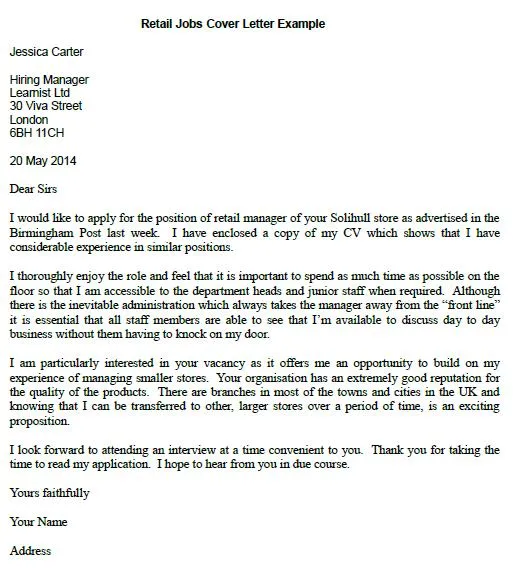
A compelling retail cover letter consists of several key elements that work together to make a strong impression. Each section plays a crucial role in highlighting your qualifications and expressing your enthusiasm for the position. These elements should be well-organized and easy to read, which makes the hiring manager’s job easier. A structured cover letter demonstrates that you possess the necessary communication skills that are required in retail jobs. Remember to customize your cover letter for each retail job you apply for, showing how you fit the specific needs of that role. By carefully crafting each section, you can create a cover letter that effectively showcases your suitability for the position and increases your chances of getting an interview. Following the correct format and including all necessary elements is essential for creating a cover letter that stands out from the competition. Below, we will explore each element in detail to help you create a winning cover letter.
Contact Information and Date
Start with your contact information, including your name, address, phone number, and email address. This information should be placed at the top of the letter. Also include the date you are writing the letter. This ensures the hiring manager can easily reach you. Ensure your email address is professional. Using a clear and easily recognizable format helps recruiters contact you efficiently. Proper contact information is essential for a professional appearance and allows the recruiter to quickly reach out to you for interviews or further information. Verify all contact details, as even small errors can create issues. Double-checking the phone number and email address is crucial. Making sure that it’s accurate can improve your chances of getting a call or email back.
Applicant’s Name, Address, Phone Number, and Email
This is where you will include your name, address, phone number, and email. Always use a professional-looking email address. Make sure all of your contact details are up-to-date and accurate. These details help the hiring manager easily contact you. It’s crucial to ensure your contact information is easy to read. This section sets the stage for a professional presentation.
Hiring Manager’s Name, Title, and Address
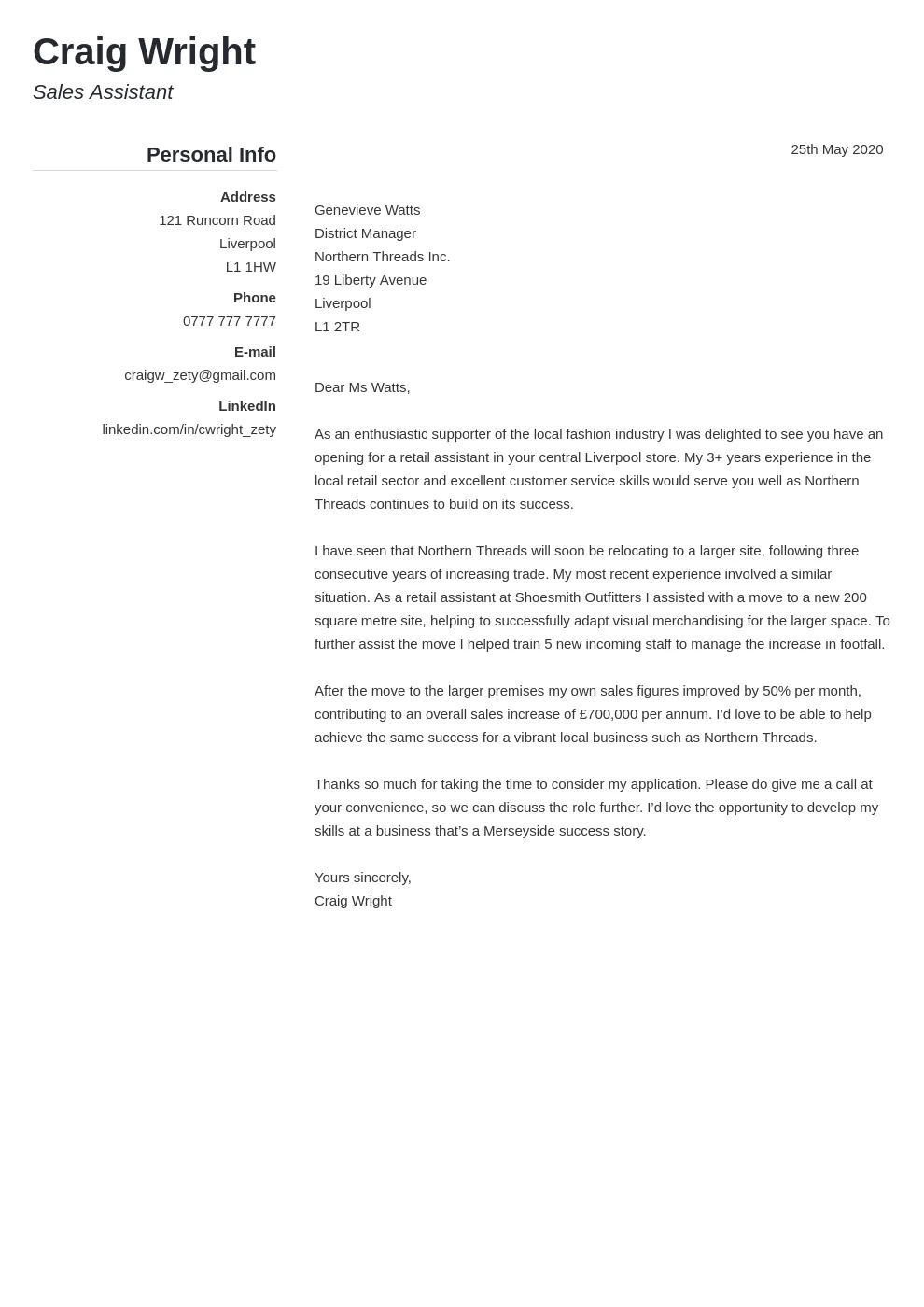
If possible, address the cover letter to a specific person, such as the hiring manager. Research the company to find out the name and title of the person responsible for hiring. This personal touch demonstrates your attention to detail and genuine interest in the role. If you can’t find a specific name, use a general salutation like ‘Dear Hiring Manager’. Correctly identifying the hiring manager is a great sign to them that you care about the opportunity. Use their title and address for the highest level of professionalism. This shows you are prepared to put in the work necessary to secure a retail job.
Salutation
Use a professional salutation, such as ‘Dear Mr./Ms. [Last Name]’ if you know the hiring manager’s name. If you do not know their name, use a general salutation, such as ‘Dear Hiring Manager’. This immediately sets a professional tone. Proper salutations show you respect their time. Getting this right is an important step for a cover letter. Ensure that your chosen salutation aligns with the company’s culture and values. Make sure you have their name correctly spelled, as a simple mistake can reflect badly.
Opening Paragraph Grab Attention
Start with a strong opening paragraph that immediately grabs the reader’s attention. State the position you are applying for and where you saw the job posting. You can also mention something specific about the company that excites you, demonstrating your genuine interest. Tailor your opening to the specific retail job. You want to show that you care about the position you are seeking. The opening is your chance to make a great first impression, so ensure that it is impactful and memorable. Think about what makes you the perfect candidate and highlight this in the opening paragraph. Always avoid generic statements and focus on making your opening unique and relevant to the specific job and company.
Highlight Your Relevant Skills and Experience
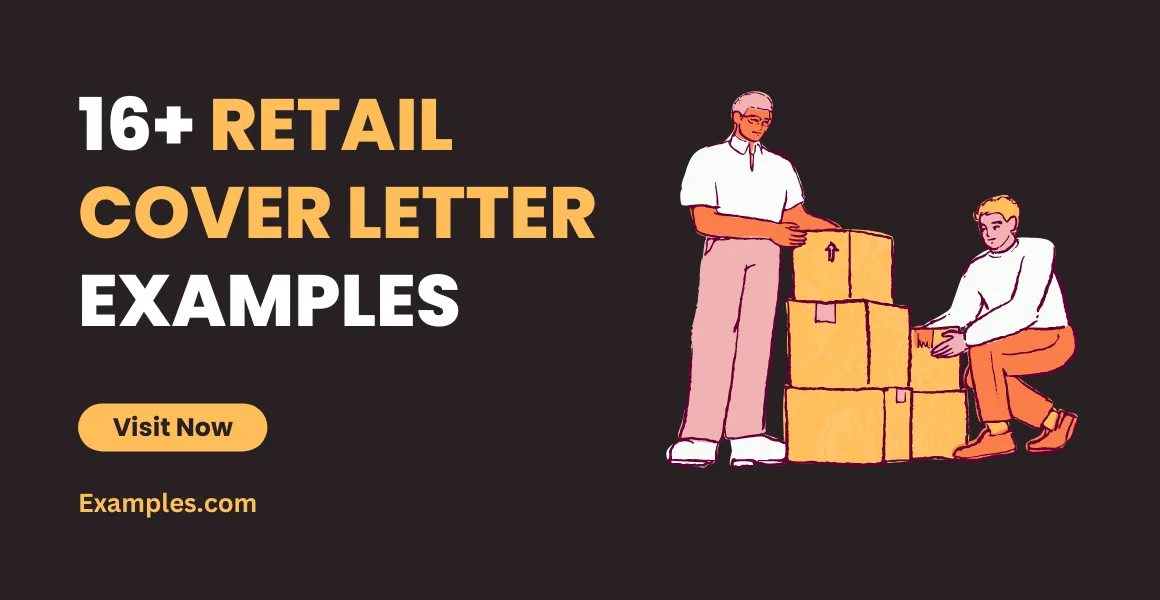
In the body of your cover letter, highlight your relevant skills and experience. Focus on the skills and experiences that align with the job description. Use specific examples to demonstrate how you have applied these skills in previous roles. Use action verbs to describe your accomplishments. Quantify your achievements whenever possible. The goal is to provide concrete evidence of your ability to perform the job. Show how your skills match the requirements. Tailor this section to each job application by highlighting the specific skills and experiences most relevant to that role. This helps the hiring manager quickly understand the value you can bring to the team.
Mention Your Relevant Retail Experience
If you have previous retail experience, be sure to mention it. Describe your roles, responsibilities, and accomplishments. Highlight any experience with sales, customer service, inventory management, or cash handling. Quantify your achievements, such as increasing sales, improving customer satisfaction, or reducing losses. Show how your previous experience has prepared you for this specific retail job. Emphasize the value of your experience to the potential employer. Include specific examples to illustrate your skills and experience. This detail demonstrates your readiness to contribute to the company’s success.
Showcase Your Soft Skills
Retail jobs require a variety of soft skills, such as communication, teamwork, problem-solving, and customer service. Provide examples of how you have demonstrated these skills in the past. Show how you have handled difficult customers or resolved conflicts. Highlight your ability to work as part of a team and contribute to a positive work environment. Tailor your examples to match the specific requirements of the job. The more you can highlight these soft skills, the more attractive you will be to the hiring manager. Good customer service skills are vital in retail jobs. They are an important aspect of your resume. Showcase your interpersonal skills through specific examples.
Quantify Your Achievements
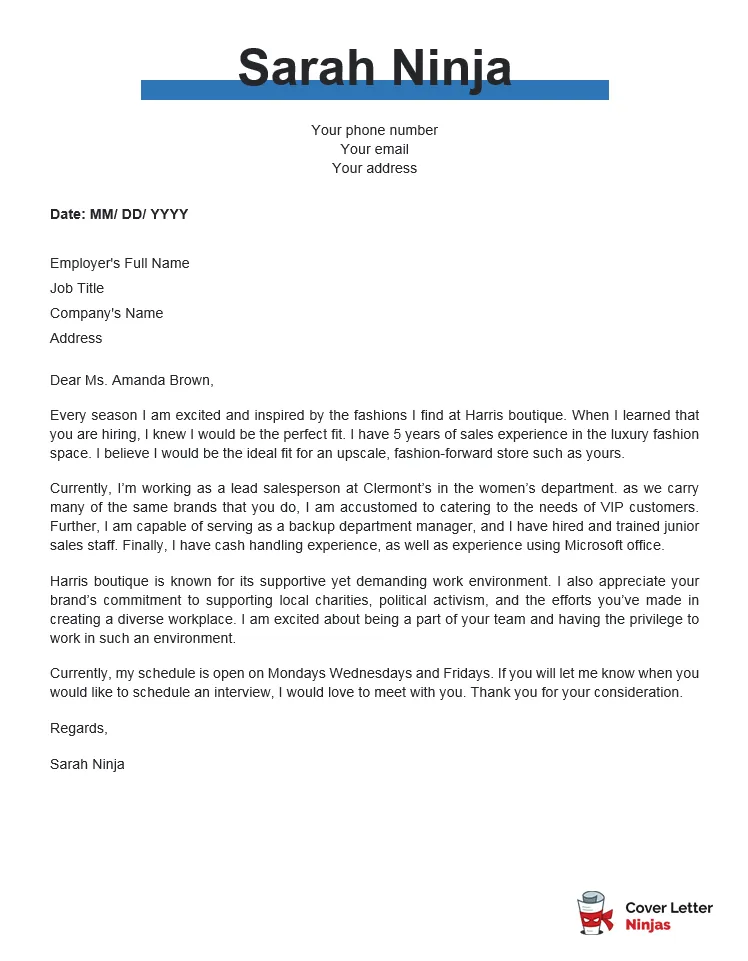
Whenever possible, quantify your achievements. Instead of saying ‘Improved sales,’ state ‘Increased sales by 15% within six months.’ Use numbers, percentages, and specific metrics to demonstrate your impact. This provides concrete evidence of your abilities and makes your accomplishments more compelling. Quantifying your achievements makes it easy for the hiring manager to see how you can contribute to the company. It also distinguishes you from other candidates. This approach shows that you can make a tangible difference. Use data and statistics. Focus on achievements that showcase your skills and value.
Express Your Enthusiasm for the Role
Express your enthusiasm for the role and the company. Explain why you are excited about the opportunity and what attracts you to the position. Show that you are genuinely interested in the company and its products or services. Research the company and tailor your letter to reflect your understanding of their values and goals. This demonstrates your proactive approach. Make sure your enthusiasm is authentic and reflects your personality. Show genuine interest in the company. This level of enthusiasm increases your chances of success. Demonstrating that you share the company’s values can also help you stand out.
Explain Why You Are a Good Fit for the Company
Explain why you are a good fit for the company and the role. Highlight how your skills and experience align with their values and mission. Research the company’s culture and tailor your letter to reflect your understanding of their values. Demonstrate that you can contribute to their success. Mention any specific aspects of the company that appeal to you. This will show that you have researched the company. This helps you demonstrate that you have the right personality for the job. Provide specific examples to back up your claims. Tailor your answers to fit the job description.
Closing Paragraph Call to Action
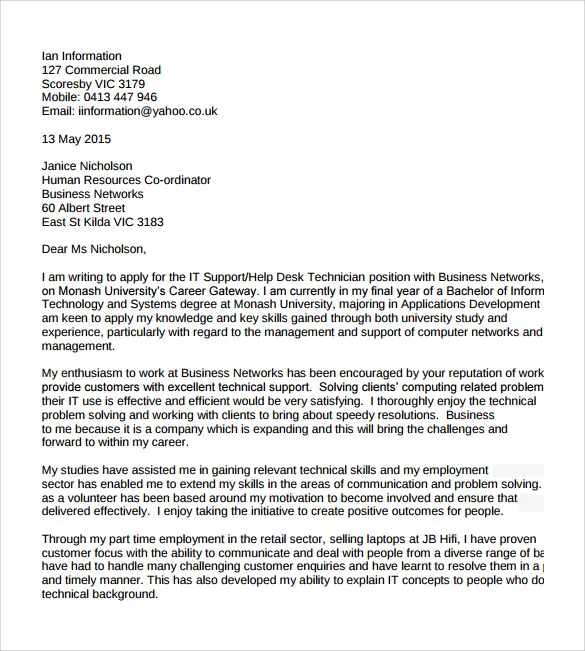
In your closing paragraph, express your interest in an interview. Reiterate your enthusiasm for the position and the company. Thank the hiring manager for their time and consideration. Provide your contact information again, making it easy for them to reach you. Close with a formal closing, such as ‘Sincerely’ or ‘Best regards’. Your closing paragraph is an important part of your cover letter. Reiterate your enthusiasm for the role. Always provide a call to action. By doing this, you make the hiring manager aware of the next step.
Express Gratitude and Reiterate Interest
Thank the hiring manager for their time and consideration. Reiterate your strong interest in the position and the company. Express your enthusiasm for the opportunity to discuss your qualifications further. This shows your appreciation for their time. This can boost your chances of getting an interview. Restate your interest to remind them of your enthusiasm. A simple expression of gratitude is a nice touch. This helps make your cover letter more personal. This last bit of effort is sure to impress.
Offer to Provide Additional Information
If appropriate, offer to provide any additional information or references that the hiring manager may need. This shows your willingness to go the extra mile. Be prepared to provide these materials promptly if requested. This demonstrates your commitment to the hiring process. It also shows you are confident about your qualifications. Showing this extra effort can significantly boost your chances.
Formal Closing
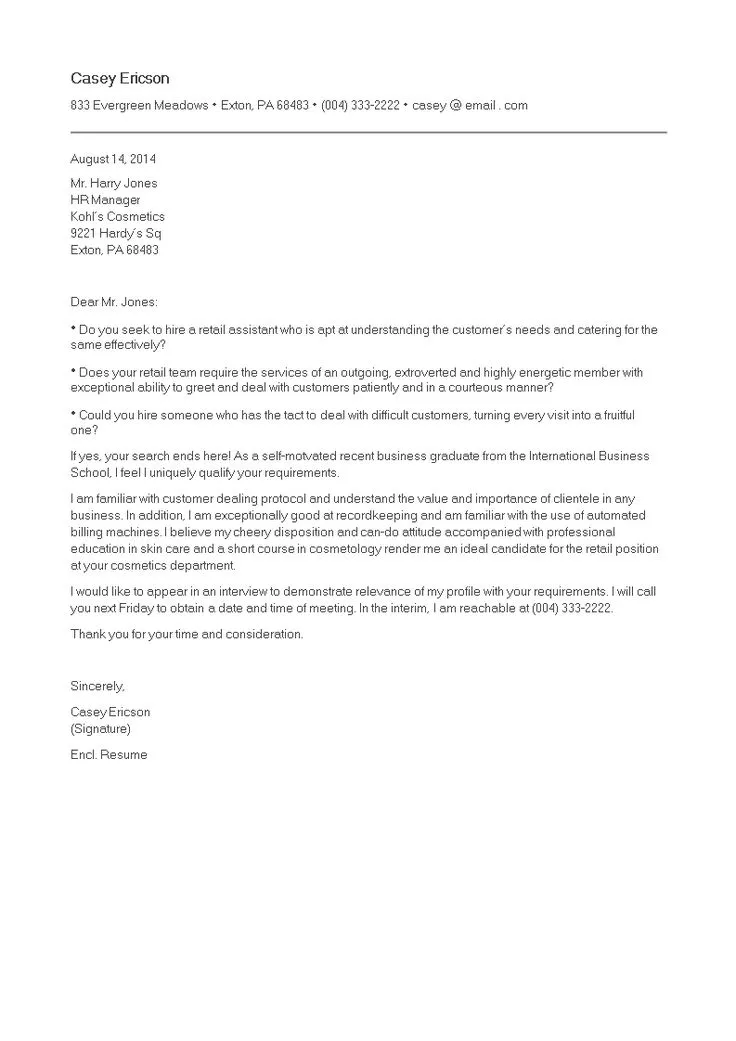
End your cover letter with a formal closing, such as ‘Sincerely,’ ‘Best regards,’ or ‘Thank you.’ Use a professional closing that is appropriate for the context. Following this, you will sign your name, or if submitting electronically, type your full name. Make sure the closing reflects the overall tone of your letter. A good closing is the final touch. It shows you are a professional, and that you are serious about your job search.
Proofreading and Formatting
Proofread your cover letter carefully for any errors in grammar, spelling, and punctuation. A polished and error-free cover letter demonstrates your attention to detail and professionalism. Use a clear and easy-to-read font, such as Times New Roman or Arial. Ensure your cover letter is properly formatted with consistent spacing and margins. Have someone else review your cover letter. Using a different set of eyes helps catch errors that you might have missed. Proofreading and formatting are essential for a strong presentation. Make sure everything looks professional and easy to read. A well-formatted letter is often a sign of good communication. Always avoid typos or mistakes.
Common Mistakes to Avoid
Avoid common mistakes that can undermine your cover letter. Make sure to avoid errors that could lead to your application being rejected. These are avoidable, and they can hurt your chances. If you eliminate them, you can increase your odds of getting hired. Knowing them, and being ready to avoid them, helps your chances. By avoiding these common mistakes, you increase your chances of making a positive impression and securing an interview. Knowing the pitfalls is crucial for success. Pay close attention to these points when crafting your letter.
Formatting Errors
Avoid formatting errors, such as inconsistent spacing, margins, and font choices. A cover letter should be visually appealing and easy to read. Ensure your cover letter adheres to a professional format. Correct formatting shows your attention to detail. Poor formatting reflects poorly on you as a potential employee. Keep it clear, clean, and simple. Avoid excessive use of bolding, underlining, and italics. Make sure that the format is consistent and professional. It will show that you care about your appearance.
Grammar and Spelling Errors
Grammar and spelling errors can significantly diminish your credibility. Always proofread your cover letter carefully. Use spell-check and grammar-check tools. Have someone else review your letter before submitting it. Eliminate typos and grammatical errors. These mistakes make you appear unprofessional and careless. Correct grammar and spelling are critical to your application. Carefully review your cover letter for any errors. Poor grammar, or spelling errors can make your application get rejected. This makes a huge difference in the impression you give.
Generic Cover Letters
Avoid using a generic cover letter that is not tailored to the specific job or company. Customize your cover letter for each application. Highlight the skills and experiences that are most relevant to the job description. Show that you have researched the company and understand their needs. A generic cover letter shows that you are not really interested in the job. Always customize your letter to make it special. If your cover letter doesn’t address the specific needs of the job, it can look like you are sending out a lot of applications with little thought. This will make you appear less enthusiastic. Customizing your cover letter demonstrates genuine interest in the role. Always make sure the application highlights the unique skills required.
Keeping it Concise
Keep your cover letter concise and to the point. Aim for one page in length. Focus on the most relevant information and avoid unnecessary details. Be selective about the information you include. Brevity helps keep the reader’s attention. The goal is to give a clear and informative summary. Always keep your letter focused. Brevity helps you get your point across quickly and effectively. If a cover letter is too long, the hiring manager might not finish reading it. Keep your letter focused, and use clear language.
Retail Cover Letter Sample
Here is an example of a retail cover letter to guide you. Tailor it to your skills and the specific job. Adapt it to include the details that apply to you. Make sure you are highlighting the right skills. This sample can help you create your own letter. Consider this a template. Review it, and make sure that it fits the job that you want. Always use this sample as a starting point. Customize the sample with your information. You can adapt the structure and the wording. Adapt the letter to suit your unique experience and the job requirements. Ensure that your letter accurately reflects your qualifications. It shows how your skills and experience align with the job posting. Use the retail cover letter sample to create your own compelling application.
